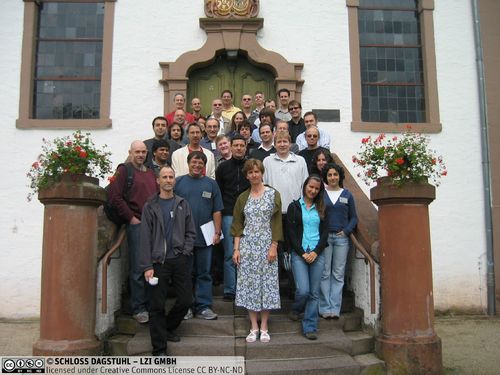Dagstuhl-Seminar 07261
Fair Division
( 24. Jun – 29. Jun, 2007 )
Permalink
Organisatoren
- Steven J. Brams (New York University, US)
- Kirk Pruhs (University of Pittsburgh, US)
- Gerhard J. Woeginger (TU Eindhoven, NL)
Kontakt
Presse/News
Press Release
"Wie kann man knappe Ressourcen und Kosten gerecht teilen? "
20.06.07(German only)
The problem of fair division—dividing goods or “bads” (e.g., costs) among entities in an impartial and equitable way - is one of the most important problems that society faces. A Google search on the phrase “fair allocation” returns over 100K links, referring to the division of sports tickets, health resources, computer networking resources, voting power, intellectual property licenses, costs of environmental improvements, etc.
There is an enormous but scattered literature on fair division in the fields of economics, political science, mathematics, operations research, and computer science, among others. In the recent years, there have been several academic books, and one popular book, on the subject.
Predictably, researchers in different disciplines study different aspects of fair division. They publish in different journals, attend different conferences, and even use different terminology. Thus, the impact of a development in one field may take years to be felt in another field.
Many problems that arise in fair division demand formal protocols, in part because of the many actors or the numerous activities they undertake that must be processed, and in part because of the need for consistency and transparency. For example, the 1982 Convention of the Law of the Sea, which was signed by 159 countries, specifies a simple cut-and-choose protocol for dividing seabed mining tracts. As more business and society interactions migrate to the web, it will become even more critical to have formal, well-studied protocols for fair division.
The general setting for most academic research is simple: There is a collection of goods or bads that need to be divided among a set of entities, but there are conditions on feasible allocations. For example, if the goods to be divided are divisible, like money or land, the situation is very different from that in which the goods are indivisible, such as most marital property in a divorce.
There are many ways to formalize “fairness,” including max-min fairness, proportional fairness, envy-free fairness, etc. These variations may or may not lead to stable allocations, resulting in so-called Nash equilibria in a game.
Recognizing the problem created by different definitions of, and approaches to, fair division, we invited top researchers and promising young scientists —including a few advanced graduate students — to the seminar. We encouraged the top researchers, several of whom had authored books or done pioneering work in their fields, to outline major research approaches and discuss important open problems. Most of the young scientists reported on their research, which tended to reflect the latest trends and innovative tools that have been applied in a variety of areas. All speakers were asked to avoid highly technical or specialized vocabulary so that people outside their disciplines could better understand the questions and issues they were raising.
To conclude, we believe the seminar opened up the eyes of many participants to aspects of fair division not normally studied within their own disciplines. The lively intellectual interchange may well spawn cross-disciplinary research collaborations. In fact, we know of three participants from different disciplines who met at the seminar and are now collaborating on a joint paper.
- Julius B. Barbanel (Union College - Schenectady, US) [dblp]
- Steven J. Brams (New York University, US) [dblp]
- Simla Ceyhan (Stanford University, US)
- Christine Chung (University of Pittsburgh, US)
- Marco Dall'Aglio (Universitá di Pescara, IT) [dblp]
- Jeff Edmonds (York University - Toronto, CA)
- Leah Epstein (Haifa University, IL) [dblp]
- Sándor Fekete (TU Braunschweig, DE) [dblp]
- Amos Fiat (Tel Aviv University, IL) [dblp]
- Claus-Jochen Haake (Universität Bielefeld, DE)
- Dorothea Herreiner (Loyola Marymount University, US) [dblp]
- Cor Hurkens (TU Eindhoven, NL)
- Nicole Immorlica (Microsoft Research - Redmond, US) [dblp]
- Kamal Jain (Microsoft Research - Redmond, US) [dblp]
- Michael A. Jones (Montclair State University, US) [dblp]
- Haim Kaplan (Tel Aviv University, IL) [dblp]
- Todd R. Kaplan (University of Exeter, GB)
- Walter Kern (University of Twente, NL)
- Marc Kilgour (Wilfrid Laurier University, CA) [dblp]
- Christian Klamler (Universität Graz, AT) [dblp]
- Elias Koutsoupias (University of Athens, GR) [dblp]
- Marek Krcal (Czech Academy of Sciences - Prague, CZ) [dblp]
- Sven O. Krumke (TU Kaiserslautern, DE)
- Asaf Levin (The Hebrew University of Jerusalem, IL)
- Katrina Ligett (Carnegie Mellon University - Pittsburgh, US) [dblp]
- Evangelos Markakis (CWI - Amsterdam, NL) [dblp]
- Claire Mathieu (Brown University - Providence, US) [dblp]
- Hervé J. Moulin (Rice University - Houston, US) [dblp]
- Rudolf Müller (Maastricht University, NL) [dblp]
- Allison M. Pacelli (Williams College - Williamstown, US)
- Stefan Pickl (Universität der Bundeswehr - München, DE) [dblp]
- Kirk Pruhs (University of Pittsburgh, US) [dblp]
- Evangelia Pyrga (MPI für Informatik - Saarbrücken, DE) [dblp]
- Matthias Raith (Universität Magdeburg, DE)
- Amin Saberi (Stanford University, US) [dblp]
- Baruch Schieber (IBM TJ Watson Research Center - Yorktown Heights, US)
- Jiri Sgall (Czech Academy of Sciences - Prague, CZ) [dblp]
- René Sitters (TU Eindhoven, NL) [dblp]
- Martin Skutella (TU Dortmund, DE) [dblp]
- Walter Stromquist (Swarthmore College, US) [dblp]
- Francis Edward Su (Harvey Mudd College - Claremont, US)
- Rob van Stee (KIT - Karlsruher Institut für Technologie, DE) [dblp]
- William A. Webb (Washington State Univ. - Pullman, US)
- Neal E. Young (University of California - Riverside, US)
- Ondrej Zajicek (Czech Academy of Sciences - Prague, CZ)
Verwandte Seminare
- Dagstuhl-Seminar 16232: Fair Division (2016-06-05 - 2016-06-10) (Details)
Klassifikation
- Interdisciplinary
- Economics
Schlagworte
- Economics
- Fairness
- Allocation
- Political Science


